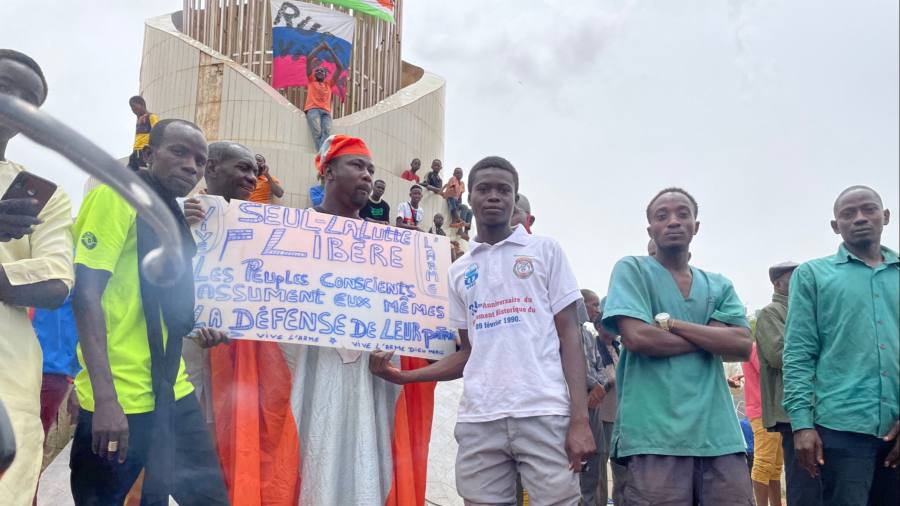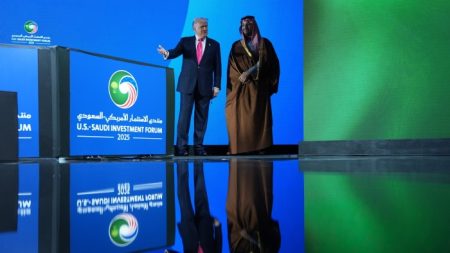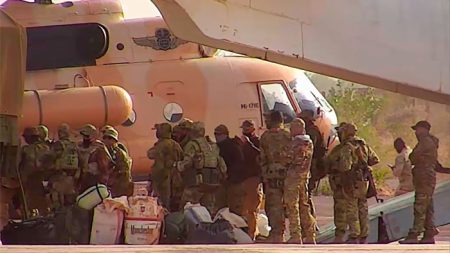Receive free Niger updates
We’ll send you a myFT Daily Digest email rounding up the latest Niger news every morning.
There was a weary familiarity about the scene late on Wednesday when a rag-tag group of soldiers in mismatching uniforms, calling themselves the National Council for the Safeguarding of the Country, took to the airwaves to declare that they had overthrown Niger’s elected government.
Similar scenes had played out in Mali and Burkina Faso, two of Niger’s neighbours, in recent years. A so-called “coup belt” of countries run by juntas and racked by conflict now stretches all the way from Mali in the west through the Central African Republic and Sudan in the east.
Niger was supposed to be different. In 2021, Mohamed Bazoum, a mild-mannered former school teacher, was elected president, cementing the country’s first democratic transition since independence from France in 1960.
Bazoum succeeded Mahamadou Issoufou, who unlike many others in the region had departed office after the end of his two constitutional terms — albeit by handing over to Bazoum, his political protégé.
As countries around Niger fell to military governments — with at least two, Mali and the CAR, subsequently turning to Russia’s Wagner Group for support in fighting insurgencies — western powers looked increasingly to Niger as a friendly country in an evermore hostile region.
“The government of Niger over quite a long time now has been a decent democratic government in an island of instability and fragility and conflict,” Mark Lowcock, former UN under-secretary-general for humanitarian affairs, told the BBC.
In return for financial and military support, Niger agreed to host western military bases and help stem the flow of people who used Niger’s vast deserts as a transit point on their way to Europe. Reeling from anti-French sentiment in much of the region, Paris came to see Niger as its “partner of last resort”.
Niger has hosted regular visits from western leaders, including US secretary of state Antony Blinken who came in March and called the country “one of the most important partners on the continent in terms of security co-operation”. Josep Borrell, the EU’s high representative for foreign policy, described Niger as a “haven of stability” when he visited last month.
Niger may have been a haven, but it was never stable. Located in a volatile region, wars rage in six of the seven countries it borders, from Libya in the north to Mali and Burkina Faso to the west.
One of the poorest countries on earth, according to the UN’s human development index, it has the world’s youngest population, with a median age of 14.8. It is also the fastest growing. Women have, on average, 6.8 children each, a rate that is expected to propel the population to 70mn by 2050, according to UN projections, 25 times bigger than at independence.
Desertification, exacerbated by climate change, is destroying the equivalent of 500 football pitches of cultivable land per year, according to the UK’s Africa minister Andrew Mitchell, another recent visitor.
Nor was Bazoum’s political base as solid as many of his western backers liked to believe. As the president — who is from a minority Arab clan — sought to establish his own power base, he came increasingly into conflict with loyalists to the previous government.
The limits of his authority became apparent this week when Omar Tchiani, head of the presidential guard, turned on the man he was paid to protect by barricading Bazoum inside his residence. Members of the military went on television the same evening to announce a coup. By Friday, Tchiani had proclaimed himself head of the junta.
“Niger is the last domino to fall,” said Cameron Hudson, a former CIA official now at the Center for Strategic International Studies think-tank. “The map looks really unfavourable to western interests right now. Our entire posture in the region is imperilled.”
The sharp change in circumstances poses a dilemma for western leaders. Ibrahim Yahaya, a Sahel expert at the Crisis Group think-tank, said that moving too hard to isolate the junta through sanctions — as happened in Mali and Burkina Faso — risked pushing the new leaders towards Moscow. In Mali, following a coup in 2021, the new regime expelled French troops and signed a contract with the Wagner mercenary group.
“Western countries have to find ways to collaborate with these countries just for the sake of not pushing them to the other side which is Russia,” Yahaya said.
As if on cue, Wagner chief Yevgeny Prigozhin on Friday welcomed Bazoum’s overthrow and offered Niger’s new leaders his services. The coup was “a battle by the people of Niger against their colonisers”, he told a Wagner-associated Telegram channel, adding that his mercenaries would do a better job of restoring order and destroying terrorists than French or US troops.
Peter Pham, former US special envoy to the Sahel, said the collapse of the west’s ally in Niger would open Washington up to criticism for having invested so heavily in an army that ended up turning its guns against the democratically elected leader.
“The political fallout will be: ‘We spent how much in investing and training the Niger military and what happened?’,” he said.
Pham thought it unlikely that anything could be done to reverse the coup. A decade ago, then-French president François Hollande sent troops into Mali after jihadis over-ran the north of the country. The demoralised and unpopular French were drummed out of the country last year on the orders of the ruing junta.
Asked if Paris might again contemplate an intervention, this time to restore democracy in Niger, Pham said: “Even for the French, those days are gone.”
Read the full article here















